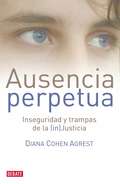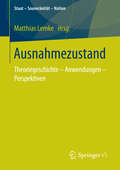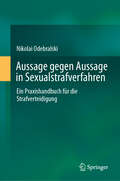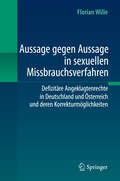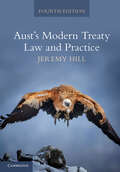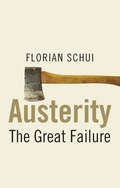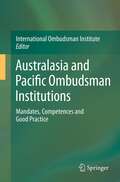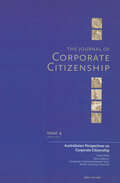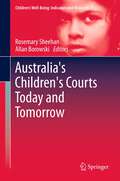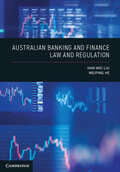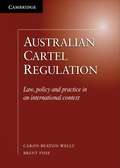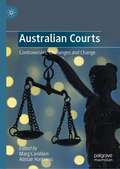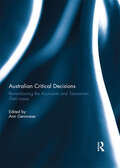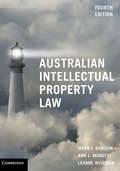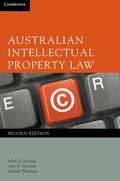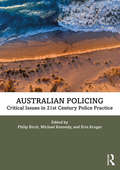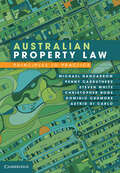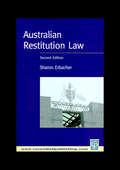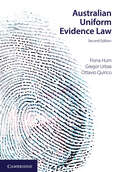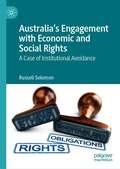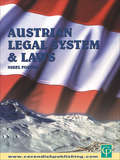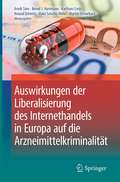- Table View
- List View
Ausencia perpetua: Inseguridad y trampas de la (in)Justicia
by Diana Cohen AgrestLa autora, además de ser filósofa y ensayista, es la madre de EzequielAgrest, asesinado durante un asalto en Caballito. En el libro reflexionaacerca de la justicia, el delito, el castigo y la experiencia de laspérdidas de las víctimas de la inseguridad. El 8 de julio de 2011 Ezequiel Agrest, de 26 años, fue asesinado duranteun asalto en el barrio de Caballito a la luz del día. En pleno juiciopor el crimen, un periodista le preguntó a Diana Cohen Agrest, madre deEzequiel y autora de estas páginas: «¿Por qué pide la prisión perpetuapara el asesino? ». Su respuesta condensó una razón tan elocuente comoirrebatible: «Porque perpetua será la ausencia de mi hijo».Reconocida filósofa y ensayista, el camino emprendido por Cohen Agresten este libro -varios de cuyos capítulos fueron originalmente publicadosen diarios y revistas- es perturbador: la Justicia argentina, susfundamentos políticos y filosóficos, históricos y coyunturales, quedanaquí brutalmente desnudos en su precariedad como pocas veces se ha vistocon tanta lucidez.Sus páginas invitan a una reflexión crítica sobre el hoy llamado«garantoabolicionismo», cuyo discurso encubre la arbitrariedad de lasleyes y la ausencia de castigo a los delitos más graves que acontecen enla Argentina y en el mundo. Provocativas, ellas interpelan nuestrascreencias y valores, aun aquellos que creíamos libres de toda sospecha.Son, también, un llamado a desarticular las promesas redentoras de unpoder que, valiéndose de controvertidos instrumentos jurídicos,profundiza las miserias de una realidad atravesada por la pobreza y lamarginalidad.Esta obra testimonial, escrita en primera persona a partir de unaexperiencia desgarradora e intransferible, logra trascender laautobiografía. En lugar del silencio mortífero, su autora eligió lapalabra para transformar el dolor en la voz de los que no tienen voz, detodas las víctimas y de sus sobrevivientes silenciados por laindiferencia y el olvido.Con una escritura visceral, punzante, «Ausencia perpetua» conmueve yconvoca a asumir un compromiso con las generaciones futuras. Por losjóvenes que tienen su vida por delante y por aquellos que, comoEzequiel, solo pueden vivir en quienes los han perdido y los recordaránsiempre.
Ausnahmezustand: Theoriegeschichte – Anwendungen – Perspektiven (Staat – Souveränität – Nation)
by Matthias LemkeIn der Krise greift die Demokratie zum Ausnahmezustand - was das bedeutet, zeigen die Beitr#65533;ge dieses Bandes. Die Ausweitung der Kompetenzen der Regierung verspricht eine effektive Krisenabwehr, sei es im Falle von terroristischen Anschl#65533;gen, Ausschreitungen, #65533;bergriffen auf Polizeibeh#65533;rden oder bei Naturkatastrophen. Dass damit eine teils erhebliche Einschr#65533;nkung b#65533;rgerlicher Freiheitsrechte einhergeht, ist die Kehrseite der Medaille. Grund genug, die Auswirkungen des Ausnahmezustandes auf die Demokratie im Blick zu behalten.
Aussage gegen Aussage in Sexualstrafverfahren: Ein Praxishandbuch für die Strafverteidigung
by Nikolai OdebralskiDie Konstellation von Aussage gegen Aussage in Strafverfahren ist die schwierigste Beweiskonstellation für alle Verfahrensbeteiligten. Eine Aussage-gegen-Aussage-Konstellation liegt vor, wenn außer der belastenden Aussage des „Opferzeugen“ keine sonstigen, unmittelbar tatbezogenen Beweismittel zur Überführung des (den Tatvorwurf bestreitenden oder schweigenden) Angeklagten vorhanden sind, sodass Grundlage für eine Einstellung oder Anklage, eine Verurteilung oder einen Freispruch allein eine Aussage ist. Diese Situation bedeutet einerseits unwägbare Risiken, ermöglicht aber zugleich auch Chancen und Spielraum für die Verteidigung des Beschuldigten. Das vorliegende Fachbuch nimmt die besonderen Herausforderungen dieser Beweiskonstellation in den Blick und zeigt Möglichkeiten für die Verteidigung auf. Neben einer umfassenden Übersicht zu einzelnen Elementen der Aussagen sowie den juristischen Anforderungen an die Beweiswürdigung wird das Werk abgerundet durch eine umfassende aktuelle Rechtsprechungsübersicht zum Thema Aussage gegen Aussage aus dem besonderen Blickwinkel des Sexualstrafrechts.
Aussage gegen Aussage in sexuellen Missbrauchsverfahren: Defizitäre Angeklagtenrechte in Deutschland und Österreich und deren Korrekturmöglichkeiten
by Florian WilleBei sexuellen Missbrauchsvorwürfen steht so gut wie immer die Existenz des Beschuldigten auf dem Spiel, gleich, ob die Beschuldigung zu Recht oder Unrecht erhoben wird. In den Fällen des sexuellen Missbrauchs geht es häufig um die beweisrechtlich schwierige Situation Aussage gegen Aussage. Hier sind Vorwürfe des öfteren falsch und die Fehlurteilsquote ist hoch. Die Verurteilung eines zu Unrecht Angeklagten begünstigen insbesondere Verfahrensmängel in der deutschen und österreichischen Strafrechtspraxis, obwohl es für beide Verfahrensordnungen effektive Korrekturmöglichkeiten gibt. In dem vorliegenden Werk werden Verfahrensdefizite in Missbrauchsverfahren in Deutschland herausgearbeitet und sodann mit der Verfahrenssituation in Österreich verglichen. Abschließend werden Vorschläge zur Verbesserung der verfahrensrechtlichen Vorschriften beider Länder unterbreitet mit dem Ziel, ein größeres Maß an Gerechtigkeit zu erreichen.
Aust's Modern Treaty Law and Practice
by Jeremy HillThis new edition of a textbook first published in 2000 provides a comprehensive account of the law of treaties from the viewpoint of two experienced practitioners. It draws on the combined experience of Anthony Aust, the original author, and Jeremy Hill, until recently Legal Counsellor in the Foreign, Commonwealth and Development Office, London. The book provides a wealth of examples of the problems experienced with treaties on a daily basis. The authors explore numerous precedents from treaties and other related documents, such as non-legally binding instruments. Using clear and accessible language, the authors cover the full extent of treaty law, with both practitioners and students in mind. Modern Treaty Law and Practice is essential reading for officials in governments and international organisations, lawyers practising in international law, and teachers and students of law, political science, international relations and diplomacy who have an interest in treaties.
Austerity
by Florian SchuiAusterity is at the center of political debates today. Its defenders praise it as a panacea that will prepare the ground for future growth and stability. Critics insist it will precipitate a vicious cycle of economic decline, possibly leading to political collapse. But the notion that abstinence from consumption brings benefits to states, societies, or individuals is hardly new. This book puts the debates of our own day in perspective by exploring the long history of austerity-a popular idea that lives on despite a track record of dismal failure. Florian Schui shows that arguments in favor of austerity were-and are today-mainly based on moral and political considerations, rather than on economic analysis. Unexpectedly, it is the critics of austerity who have framed their arguments in the language of economics. Schui finds that austerity has failed intellectually and in economic terms every time it has been attempted. He examines thinkers who have influenced our ideas about abstinence from Aristotle through such modern economic thinkers as Smith, Marx, Veblen, Weber, Hayek, and Keynes, as well as the motives behind specific twentieth-century austerity efforts. The persistence of the concept cannot be explained from an economic perspective, Schui concludes, but only from the persuasive appeal of the moral and political ideas linked to it.
Australasia and Pacific Ombudsman Institutions: Mandates, Competences and Good Practice
by International Ombudsman InstituteCommissioned by the International Ombudsman Institute (IOI), the Ludwig Boltzmann Institute of Human Rights (BIM) in Vienna conducted a comparative analytical study on Ombudsman Institutions in the Australasia and Pacific region between January 2011 and April 2012. In Part 1, this book provides an analytical comparison of the public sector Ombudsman Institutions in Australia (the Commonwealth Ombudsman and the state/territory Ombudsmen of all Australian states as well as of the Northern Territory and the ACT), the Cook Islands, Hong Kong, New Zealand, Papua New Guinea, Samoa, Taiwan, Tonga and Vanuatu. In addition to a comparative analysis showing the partial heterogeneity of the Institutions, a comprehensive overview of common features, and explorations of the specifics and peculiarities of the Institutions, Part 2 presents separate reports on the 16 different jurisdictions featuring their main functions as follows: - Legal basis, legal status and organisation, - Mandate, object of control and standard of control, - Powers, including legal quality and impact of the outcomes of investigative procedures, - Relationship to the administration, the judiciary and the legislator, and - Special characteristics. Part 2 is based on information provided by the Institutions themselves in questionnaires sent out at the outset of the study, an analysis of the respective establishing acts and other relevant laws, and on relevant scientific publications and the Institutions' Annual Reports. The reports also refer to relevant legal provisions and include websites addresses for ease of reference.
Australasian Perspectives on Corporate Citizenship: A special theme issue of The Journal of Corporate Citizenship (Issue 4)
by Birch DavidThis special issue, devoted to Australasian perspectives, is timely in a debate in the region that is gaining momentum every day. Contributors to this issue are leading scholars in the field in Australia, New Zealand and India .
Australia's Children's Courts Today and Tomorrow (Children’s Well-Being: Indicators and Research #7)
by Rosemary Sheehan Allan BorowskiThe Children's Court is one of society's most important social institutions. At the same time, it is steeped in controversy. This is in large measure due to the persistence and complexity of the problems with which it deals, namely, juvenile crime and child abuse and neglect. Despite the importance of the Children's Court as a means of holding young people accountable for their anti-social behaviour and parents for the care of their children, it has not been the subject of close study. Certainly it has not been previously studied nationally. This book, an edited collection, is based on the findings of study that spanned the six States and two Territories of Australia. The study sought to examine the current challenges faced by the Children's Court and to identify desirable and feasible directions for reform in each State and Territory. A further unique feature of this study is that it canvassed the views of judges and magistrates who preside over this court.
Australian Banking and Finance Law and Regulation
by Weiping He Han-Wei LiuAustralian Banking and Finance Law and Regulation provides a comprehensive, up-to-date and accessible introduction to the complexities of contemporary law and regulation of banking and financial sectors in one volume. The book provides a detailed analysis of Australia's financial market regulatory framework and the theoretical underpinnings of government intervention in the field. It delves into the legal changes implemented in response to the Global Financial Crisis and recent local scandals, exploring the complexities and subtleties of the 'banker–customer' relationship. Readers will appreciate the clear and concise treatment of key issues, cases and examples that offer an overview of major developments. The questions and answers at the end of each chapter serve as an effective tool for readers to assess and reinforce their grasp of the fundamental principles discussed.
Australian Cartel Regulation
by Caron Beaton-Wells Brent FisseCartel regulation is a prime element of competition policy and an essential means of minimising the adverse effects of cartel activity on economic welfare. However, effective cartel regulation poses distinct challenges for governments, competition authorities and commentators across the globe. In Australian Cartel Regulation, leading competition law experts Caron Beaton-Wells and Brent Fisse reflect on developments in anti-cartel law in Australia over the last 30 years. They provide a comprehensive account of the current law on cartels as well as discussing key issues that may arise in the future. This definitive volume not only identifies the practical and theoretical issues, but also recommends workable solutions, and does so with the benefit of comparative analysis of the anti-cartel laws of major overseas jurisdictions. Many of the issues identified and discussed in Australian Cartel Regulation are common to any scheme designed to regulate cartel conduct.
Australian Climate Law in Global Context
by Jacqueline Peel Alexander Zahar Jacqueline Peel Lee Godden Alexander ZaharAustralian Climate Law in Global Context is a comprehensive guide to current climate change law in Australia and internationally. It includes discussion of: emission trading schemes and carbon pricing laws, laws on renewable energy, biosequestration, carbon capture and storage and energy efficiency; the trading of emission offsets between developed and developing countries, the new international scheme for the protection of forests (REDD) and the transfer of green finance and technology from developed to developing states, the adaptation to climate change through legal frameworks. It assesses the international climate change regime from a legal perspective, focusing on Australia's unique circumstances and its domestic implementation of climate-related treaties. It considers how the challenge of climate change should be integrated into broader environmental law and management. It is a valuable resource for students in law and environmental science, for current and future legal practitioners and for policy-makers and those in the commercial sector.
Australian Commercial Law
by Anne Matthew Dilan Thampapillai Claudio Bozzi Vivi Tan Dilan Thampapillai Claudio Bozzi Vivi TanAustralian Commercial Law offers a concise yet comprehensive introduction to commercial law in Australia. The textbook provides a thorough and detailed discussion of a variety of topics in commercial law such as agency, bailment, the sale of goods, the transfer of property and the Personal Property Securities Act. The book also offers a detailed overview of topics within the Australian Consumer Law that are now relevant to commercial practice such as unconscionable conduct, consumer guarantees, and misleading and deceptive conduct. Written in a clear and accessible style, each chapter features key points and further reading to enhance students' understanding. Significant cases are discussed in detail and include excerpts from judgments to illustrate points of law. Australian Commercial Law is an indispensable resource for students who are seeking a comprehensive understanding of commercial law.
Australian Courts: Controversies, Challenges and Change
by Alistair Harkness Marg CamilleriThis edited collection brings together scholars and practitioners in every chapter to provide a comprehensive and unique exploration of courts in Australia. The primary focus is to identify controversies, challenges and change, in the form of potential reforms within the courts across Australian jurisdictions. Bringing forward original research and scholarship on a wide array of courts in Australia, combined with insightful practitioner perspectives, research will be effectively integrated with practice. This book is the first comprehensive collection of its kind to canvas the diversity of courts in Australia, providing comprehensive critical analysis of contemporary issues, debates and reforms. It considers the array of courts across state, territory and national jurisdictions in Australia, including coroners’ courts, family courts, criminal, civil courts and problem solving courts. It also adopts an intersectional approach, providing insights into the perspectives of various court users such as people with disability, ethnic minorities, Indigenous Australians, and victims of crime. Each chapter provides opportunities for further debate among scholars, practitioners and students regarding potential future directions for reform to improve the efficacy, equity and accessibility of Australian courts.This collection serves as an international ready reference for students, scholars and practitioners alike.
Australian Critical Decisions: Remembering Koowarta and Tasmanian Dams
by Ann GenoveseThe 1980s was a time of significant social, political and cultural change. In Australia law was pivotal to these changes. The two High Court cases that this book explores- Koowarta v Bjelke-Petersen in 1982 and the Tasmanian Dams case in 1983- are famous legally as they marked a decisive reckoning by the Court with both international law and federal constitutionalism. Yet these cases also offer a significant marker of Australia in the 1980s: a shift to a different form of political engagement, nationally and internationally, on complex questions about race, and the environment. This book brings these cases together for the first time. It does so to explore not only the legal legacy and relationship between Koowarta and Tasmanian Dams, but also to reflect on how Australians experience their law in time and place, and why those experiences might require more than the usual legal records. The authors include significant figures in Australian public life, some of whom were key participants in the cases, as well as established and respected scholars in law, history, Indigenous and environmental studies. The book offers a combination of personal recollections of the cases- the drama of how they were brought before the courts and decided- as well as a consideration of the cases’ ongoing significance in Australian life. This book was previously published as two special issues in the Griffith Law Review.
Australian Intellectual Property Law
by Leanne Wiseman Mark J. Davison Ann L. Monotti Mark J. Davison Ann L. MonottiIntellectual property law in Australia is a constantly changing field. Developments in technology, such as in the life sciences and in the digitisation of the creation, analysis, distribution and use of information, along with economic globalisation, are having an increasingly significant impact on this field of law. The third edition of Australian Intellectual Property Law has been updated to include the most important recent developments in intellectual property law, including: - the 'Raising the Bar' amendments to the Patents Act and case law concerning the meaning of 'manner of manufacture' - proposed reforms to the Copyright Act - the High Court's consideration of trademarks in various contexts - recent statutory changes and court judgments. Through its comprehensive discussion of the black-letter aspects of the law, and primary emphasis on legal principles and complexities, Australian Intellectual Property Law continues to offer a detailed and scholarly insight into Australian intellectual property law for students and professionals.
Australian Intellectual Property Law
by Leanne Wiseman Mark J. Davison Ann L. MonottiThe fourth edition of Australian Intellectual Property Law provides a detailed and comprehensive, yet concise and accessible discussion of intellectual property law in Australia. This edition has been thoroughly revised to cover the most recent developments in intellectual property law, including significant case law and discussion of the proposed and enacted amendments to the Copyright Act 1968 (Cth), the Patents Act 1990 (Cth) and the Plant Breeder's Rights Act 1994 (Cth). The text has been restructured, but continues to provide a complete discussion of the black-letter aspects of the law. Commencing with copyright, then followed by design law, confidential information, patents, plant breeder's rights, then finally trade marks. The work ends with a chapter on enforcing legal rights and civil remedies. Written by highly-respected intellectual property law researchers this text is an invaluable resource for both undergraduate and postgraduate students, academics and other professionals working with intellectual property.
Australian Intellectual Property Law
by Mark Davison Ann Monotti Leanne WisemanIntellectual property law in Australia has changed dramatically in the last decade and continues to change. Developments in technology, the rise of the internet, the globalisation of trade and the increasing importance of 'superbrands' - trade marks with global appeal - have all affected the laws surrounding intellectual property. Furthermore, globalisation has resulted in greater pressure on intellectual property owners to expand their rights as they endeavour to capture the potential benefits of ownership in an increasingly affluent and integrated world economy. Australian Intellectual Property Law, 2nd edition has been fully revised to take into account these significant case and legislative developments in trademarks, copyright and patents law. This book offers students and legal professionals a detailed discussion of the black-letter aspects of the law, with a primary emphasis on legal principles and complexities.
Australian Policing: Critical Issues in 21st Century Police Practice
by Michael Kennedy Philip Birch Erin KrugerThis edited collection brings together leading academics, researchers, and police personnel to provide a comprehensive body of literature that informs Australian police education, training, research, policy, and practice. There is a strong history and growth in police education, both in Australia and globally. Recognising and reflecting on the Australian and New Zealand Policing Advisory Agency (ANZPAA) education and training framework, the range of chapters within the book address a range of 21st-century issues modern police forces face. This book discusses four key themes: Education, training, and professional practice: topics include police education, ethics, wellbeing, and leadership Organisational approaches and techniques: topics include police discretion, use of force, investigative interviewing, and forensic science Operational practices and procedures: topics include police and the media, emergency management, cybercrime, terrorism, and community management Working with individuals and groups: topics include mental health, Indigenous communities, young people, hate crime, domestic violence, and working with victims Australian Policing: Critical Issues in 21st Century Police Practice draws together theoretical and practice debates to ensure this book will be of interest to those who want to join the police, those who are currently training to become a police officer, and those who are currently serving. This book is essential reading for all students, scholars, and researchers engaged with policing and the criminal justice sector.
Australian Property Law: Principles to Practice
by Steven White Michael Nancarrow Penny Carruthers Christopher Boge Dominic Cudmore Astrid Di CarloAustralian Property Law: Principles to Practice is an engaging introduction to property law in Australia. Covering substantive law and procedural matters, this textbook presents the law of personal and real property in a contemporary light. Australian Property Law details how property law practice is transformed by technology and provides insights into contemporary challenges and risks. Taking a thematic approach, the text covers possession of goods and land, land tenure, estates and future interests, property registration systems, Indigenous land rights and native title, social housing, Crown land and ethics. Complex concepts are contextualised by linking case law and legislation to practical applications. Each chapter is supported by digital tools including case and legislation boxes with links to the full source online, links to useful online resources, multiple-choice questions, review questions and longer narrative problems. Australian Property Law provides an essential introduction to the principles and practice of property law in an ever-changing technological environment.
Australian Restitution Law (Australian Principles)
by Sharon ErbacherThis book is the first casebook on restitution law to be published in Australia. It contains comprehensive extracts from the most significant Australian and English cases, together with some Canadian cases which indicate the possible direction which Australian law will take. The author has included substantial commentaries following the extracts, in order to further explain the decisions from overseas jurisdictions, to place those decisions in an Australian context. In the last decade, there has been a significant number of Australian decisions which deal with important concepts in restitution, and which supplement, qualify or refine the English law of restitution. The focus in this book on the Australian position makes it an invaluable resource for anyone who is studying or researching restitution law in Australia.
Australian Uniform Evidence Law
by Gregor Urbas Ottavio Quirico Fiona HumNow in its second edition, Australian Uniform Evidence Law provides a clear, accessible introduction to the law of evidence. Following the structure of the Evidence Act 1995 (Cth), the text introduces students to basic principles, then covers more complex elements of evidence law. Cases and excerpts from legislation have been selected to guide students through the application of the Act. This edition has been updated to include significant recent case examples and decisions. Each chapter includes a summary of key points, definitions and practice questions to encourage students to apply their knowledge to realistic scenarios. The final chapter comprises longer-form, complex problems designed to test students' understanding of the concepts and rules covered in the Act as a whole. Guided solutions to each question are provided so students can check their understanding. Providing clear explanations and examples, Australian Uniform Evidence Law is an essential resource for all students of evidence law.
Australia’s Engagement with Economic and Social Rights: A Case of Institutional Avoidance
by Russell SolomonThis book is a contemporary socio-legal study of Australia’s protection of economic and social rights. Despite Australia’s hortatory language of compliance with international rights standards, its translation of these standards into domestic law and policy has been found wanting. In considering Australia’s compliance across the policy areas of health, housing, labour and social security, it is argued that Australia’s failings can be understood in terms of its institutional framework. This framework provides incomplete legal protection for rights and leaves that protection almost exclusively in the realm of politics and policymaking, an arena still dominated by neoliberalism and a political culture averse to the protection and promotion of economic and social rights.
Austrian Legal System and Laws
by Nigel FosterThis book provides an introduction to the Austrian state,legal system and laws. It provides a guide to a number of areas of Austrian substantive law, concentrating on the most important areas of public and private law. The book considers in depth, the historical, political, social and economic aspects of the Austrian State to give more background for those coming afresh to Austrian studies. This book will appeal to academic comparative lawyers across a range of disciplines and academics who require fundamental information on the Austrian state and legal systems. It will make attractive supplementary reading on comparative law courses, especially for those students spending a third year in Austria. It will also prove useful for politics and economics or multidisciplinary studies students who study Austria either directly or for comparison with other countries.
Auswirkungen der Liberalisierung des Internethandels in Europa auf die Arzneimittelkriminalität
by Karlhans Liebl Arndt Sinn Hans Schulte-Nölke Bernd J. Hartmann Roland Schmitz Martin SteinebachDieses Handbuch beleuchtet den Internetversandhandel mit illegalen Arzneimitteln über illegale Online-„Apotheken“, der sich zu einem auffälligen Wachstumsmarkt entwickelt hat. Durch die hohen Gewinnmargen und das niedrige Entdeckungsrisiko ist der Handel mit gefälschten Arzneimitteln mittlerweile weitaus attraktiver geworden als der Handel mit Betäubungsmitteln und bietet Potential als Geschäftsfeld der organisierten Kriminalität.Diesem Szenario entsprechend verfolgt das Handbuch bei der Untersuchung internetgestützter Arzneimittelkriminalität einen ganzheitlichen Ansatz, indem eine empirische Aufarbeitung der Täter- und Tatstrukturen in diesem Kriminalitätsbereich ebenso vorgenommen wird wie die Zeichnung des Lagebildes für die Bundesrepublik Deutschland. Im Hauptteil wird die Rechtslage zur Arzneimittelkriminalität in allen 28 EU-Mitgliedstaaten mit schwerpunktmäßiger Berücksichtigung der Aspekte des materiellen Straf- und Prozessrechts rechtsvergleichend aufbereitet, und es werden die einschlägigen internationalen Vorgaben im Bereich der Arzneimittelkriminalität beleuchtet. Außerdem werden zivil- und öffentlich-rechtliche Interventions- und Präventionsalternativen vorgestellt. Nicht zuletzt wird auch eine für die Ermittlungsarbeit entwickelte technische Lösung zur Verfolgung von Arzneimittelstraftaten im Internet vorgestellt. Einschlägige case-studies und eine Szenarioanalyse zur prognostischen Entwicklung der Arzneimittelkriminalität runden die Darstellung ab.Abschließend werden sowohl der Reformbedarf erhoben als auch konkrete Handlungsempfehlungen ausgesprochen, um Konzepte der Verfolgung internetgestützter Arzneimittelkriminalität in Deutschland und Europa zu verbessern und eine breite Datenbasis für den Gesetzgeber zur effektiveren Gesetzgebung zu schaffen.
